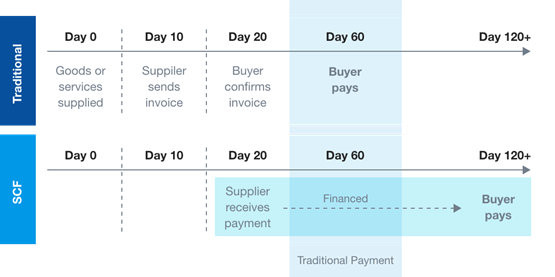
With COVID related restrictions being gradually lifted in many parts of Canada, we are beginning to see how businesses shift once more to the changing landscape. Some have fared well through the pandemic, but many Canadian companies have and will continue to struggle in the coming months and years.
Overview
Unfortunately, the end of government stimulus efforts (just as the economy is set to grow) will put a further strain on firms that are already struggling. When coupled with product and labour shortages, it is fair to say that it could be a very challenging time ahead for your organization and, critically, for organizations who form part of your supply chain.

Unfortunately, the end of government stimulus efforts (just as the economy is set to grow) will put a further strain on firms that are already struggling. When coupled with product and labour shortages, it is fair to say that it could be a very challenging time ahead for your organization and, critically, for organizations who form part of your supply chain.

What to watch for
Keeping a close eye on the solvency of your clients is key to avoiding unexpected loss from non-payment. However, assessing solvency and liquidity is no easy task and gaining access to the right information to make this assessment can be even more challenging.
There is always a lag in publicly reported information which is far from ideal, especially now - when keeping ahead of events that could adversely impact solvency or liquidity is more important than ever.
In essence – be inquisitive and question the reasoning for any change in behaviour from your clients. Any departure from the ‘norm’ could be a sign of distress, so enter regular dialogue with your clients and seek to understand what is driving any change in their normal trading behaviour.
Having a good understanding of your clients current working capital requirements and liquid resources available is key. Changes in these levels either way (see hidden perils below) can be an indication that a frank conversation is needed to ensure losses are mitigated and/or avoided.
There are some key warning signs of potential declining solvency and/or liquidity that you can look out for with your clients:
Keeping a close eye on the solvency of your clients is key to avoiding unexpected loss from non-payment. However, assessing solvency and liquidity is no easy task and gaining access to the right information to make this assessment can be even more challenging.
There is always a lag in publicly reported information which is far from ideal, especially now - when keeping ahead of events that could adversely impact solvency or liquidity is more important than ever.
In essence – be inquisitive and question the reasoning for any change in behaviour from your clients. Any departure from the ‘norm’ could be a sign of distress, so enter regular dialogue with your clients and seek to understand what is driving any change in their normal trading behaviour.
Having a good understanding of your clients current working capital requirements and liquid resources available is key. Changes in these levels either way (see hidden perils below) can be an indication that a frank conversation is needed to ensure losses are mitigated and/or avoided.
There are some key warning signs of potential declining solvency and/or liquidity that you can look out for with your clients:
So how do you access such information?
A credit insurance partner can obtain and assess this information and will insure you against the risk of non-payment from your buyers (clients).
Client information regularly obtained by Credit Insurers:
- Recent Management Accounts (rather than just waiting for outdated published accounts)
- Cashflow forecasts – a 13 week rolling forecast is especially insightful and predictive.
- Live payment performance data – Client payments slowing? Early warning signs.
A good Credit Insurer will also investigate and convey live issues impacting your clients such as:
- How your client plans to address any impending cashflow shocks
- How are they approaching the end of furlough?
- How will they bridge any gaps left by the end of other stimulus programmes?
- How are they addressing the wider issues in global supply chains such as raw materials shortages, increases in raw materials costs, longer delivery times, and how does this impact the type of contracts they enter? (Fixed cost or cost plus?).
- Does your client have other measures in place (such as a trade credit insurance policy) to mitigate issues in their supply chain?
A credit insurance partner can obtain and assess this information and will insure you against the risk of non-payment from your buyers (clients).
Client information regularly obtained by Credit Insurers:
- Recent Management Accounts (rather than just waiting for outdated published accounts)
- Cashflow forecasts – a 13 week rolling forecast is especially insightful and predictive.
- Live payment performance data – Client payments slowing? Early warning signs.
A good Credit Insurer will also investigate and convey live issues impacting your clients such as:
- How your client plans to address any impending cashflow shocks
- How are they approaching the end of furlough?
- How will they bridge any gaps left by the end of other stimulus programmes?
- How are they addressing the wider issues in global supply chains such as raw materials shortages, increases in raw materials costs, longer delivery times, and how does this impact the type of contracts they enter? (Fixed cost or cost plus?).
- Does your client have other measures in place (such as a trade credit insurance policy) to mitigate issues in their supply chain?
Understand the hidden perils
In recent years, assessing a firm’s true working capital / debt position has been made more difficult by one issue: Supply chain finance (AKA SCF, reverse factoring / payables finance).
Supply chain finance (SCF) enables suppliers to receive payment early and buyers to pay later (see below):

In the main, SCF greatly benefits supply chain liquidity, but in some instances, it can create unexpected liquidity crises and a false sense of normality in terms of the timing of payments.
When used prudently, SCF can be a useful tool in managing working capital and increasing liquidity in a supply chain, but overreliance can create significant risk in the overall network. This risk is due to the distortion of the natural working capital requirements in an industry and the severe impacts on liquidity occurring if the facilities are withdrawn.
In severe circumstances, firms can go from a picture of health using traditional ratios to insolvent, virtually overnight when a SCF facility is withdrawn. Lack of disclosure in audited accounts often makes SCF facilities very difficult to identify (although new reporting standard requirements are expected to address some of this soon).
In recent years, assessing a firm’s true working capital / debt position has been made more difficult by one issue: Supply chain finance (AKA SCF, reverse factoring / payables finance).
Supply chain finance (SCF) enables suppliers to receive payment early and buyers to pay later (see below):

In the main, SCF greatly benefits supply chain liquidity, but in some instances, it can create unexpected liquidity crises and a false sense of normality in terms of the timing of payments.
When used prudently, SCF can be a useful tool in managing working capital and increasing liquidity in a supply chain, but overreliance can create significant risk in the overall network. This risk is due to the distortion of the natural working capital requirements in an industry and the severe impacts on liquidity occurring if the facilities are withdrawn.
In severe circumstances, firms can go from a picture of health using traditional ratios to insolvent, virtually overnight when a SCF facility is withdrawn. Lack of disclosure in audited accounts often makes SCF facilities very difficult to identify (although new reporting standard requirements are expected to address some of this soon).
What can you do?
As with other supply chain risks, regularly updating your assessment of your stakeholders is the best preparation for potential shocks. This begins with thorough credit evaluation and continues with regular dialogue and monitoring – all of which a good Credit Insurer can undertake for you.
Key points to evaluate:
Thoroughly understand your client’s financial position and plans
A thorough and regularly updated understanding of their financial position and how they are approaching any impending issues
Include any exposures to “the hidden perils”
Active discussion about any off-balance sheet financing being used including Supply Chain Finance. In the case of supply chain finance, understanding any contingency plans in place to work through potential withdrawal of the facilities. How are your clients using the excess cash derived from SCF payments?
Don’t rely on history!
The warning “Historical results may not be an indicator of future performance” is particularly true as we work through the longer-term impacts of the pandemic. Relying purely on credit ratings based on 2019 or even 2020 financial results risks missing major issues in supplier financial position.
Ensure you are insured against any issues that do arise.
Ensuring you and even your extended network have trade credit insurance in place to cover any unexpected exposures can help ensure the cash owed for goods and services continues to flow even when issues do arise.
Be proactive and work with your suppliers
You, your suppliers, and your buyers form an important commercial network – you are part of the supply chain! Therefore, keeping the line of communication open and working with your suppliers/buyers to move through potential issues can often be the most expedient and least costly approach to dealing with supply chain shocks.
As with other supply chain risks, regularly updating your assessment of your stakeholders is the best preparation for potential shocks. This begins with thorough credit evaluation and continues with regular dialogue and monitoring – all of which a good Credit Insurer can undertake for you.
Key points to evaluate:
Thoroughly understand your client’s financial position and plans
A thorough and regularly updated understanding of their financial position and how they are approaching any impending issues
Include any exposures to “the hidden perils”
Active discussion about any off-balance sheet financing being used including Supply Chain Finance. In the case of supply chain finance, understanding any contingency plans in place to work through potential withdrawal of the facilities. How are your clients using the excess cash derived from SCF payments?
Don’t rely on history!
The warning “Historical results may not be an indicator of future performance” is particularly true as we work through the longer-term impacts of the pandemic. Relying purely on credit ratings based on 2019 or even 2020 financial results risks missing major issues in supplier financial position.
Ensure you are insured against any issues that do arise.
Ensuring you and even your extended network have trade credit insurance in place to cover any unexpected exposures can help ensure the cash owed for goods and services continues to flow even when issues do arise.
Be proactive and work with your suppliers
You, your suppliers, and your buyers form an important commercial network – you are part of the supply chain! Therefore, keeping the line of communication open and working with your suppliers/buyers to move through potential issues can often be the most expedient and least costly approach to dealing with supply chain shocks.
Sign-up to be notified about future articles from the Resilience Series, and other thoughts, reports or insights from QBE.

